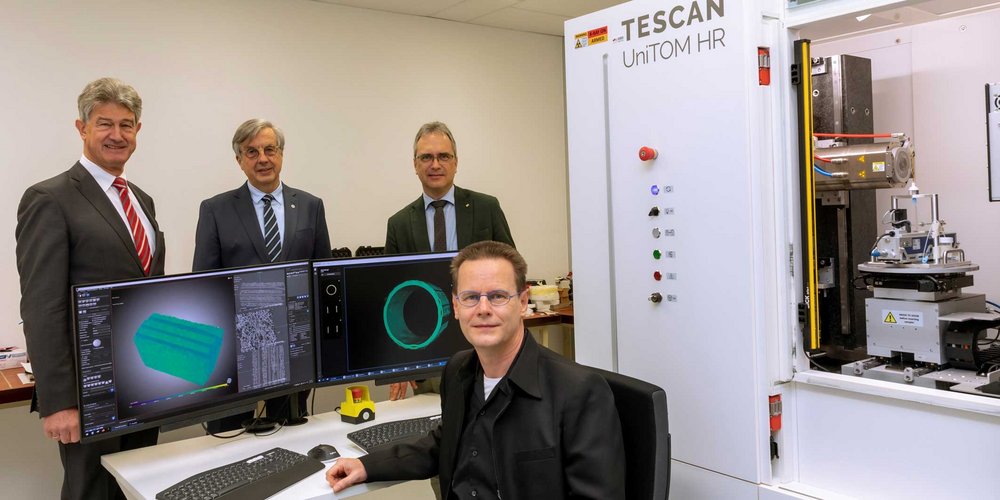What happens inside a piece of concrete when it comes into contact with acid? How absorbent is a paper tissue? How much does the volume of a battery change under certain voltage and current conditions? Is the interior of a tablet structured in such a way that it dissolves at the right time and releases the active ingredient optimally? Answers to these and other questions regarding materials and structure are provided by two new highly innovative micro-CT devices in the basement of the physics building of Graz University of Technology (TU Graz) at Campus Neue Technik. The devices open up a window into materials of all kinds at the nanometre scale without destroying the material samples.
Read more about the areas of application and how the two devices work in the Planet Research article “Micro-CT Lab: Looking deeply into material structures“.
Strengthening basic research at universities
The devices were presented to the public today in the presence of the Rectors of the Medical University of Graz, TU Graz and the University of Graz. The three Graz universities have purchased the micro-CTs as part of the Graz-µCT consortium with financial support from an R&D infrastructure grant from the Austrian Research Promotion Agency FFG. The aim of the purchase was to enhance basic research at the universities in the fields of medicine, pharmaceutical research, geology, metallurgy and pulp and paper technology with in-situ experiments.
Austria-wide unique research infrastructure
The new devices are the first in Austria to enable in-situ measurements to be carried out. They were developed by the TESCAN company to meet the requirements of the research work. And in the future, they will not only be available to consortium members. On request, external universities and non-university research institutions will also be able to use this infrastructure, which is unique in Austria, or cooperate with the Graz-µCT consortium.
Top-level research
TU Graz Rector Harald Kainz is enthusiastic about the new research infrastructure equipment: “I’m proud that we have the opportunity to use such highly innovative research equipment at TU Graz. This novel method of examining materials without destroying the samples in the process heralds a new era in materials research.”
For the Rector of the Medical University of Graz, Hellmut Samonigg, the innovative Micro-CT Lab is “another important building block for the joint forward-looking research of the University of Graz, TU Graz and the Medical University of Graz, which will make a significant contribution to the national and international profile of top-level research in Graz.”
Peter Riedler, the executive Rector of the University of Graz, takes the same line: “The Graz-µCT consortium is a perfect example of successful cooperation between the universities at the Graz location. University research at the highest level is carried out here.
Contact the Graz-µCT consortium:
Robert SCHENNACH
Ao.Univ.-Prof. Mag. Dr.rer.nat.
Petersgasse 16/II
8010 Graz
robert.schennach@tugraz.at
https://www.tugraz.at/projekte/gmct/home/
